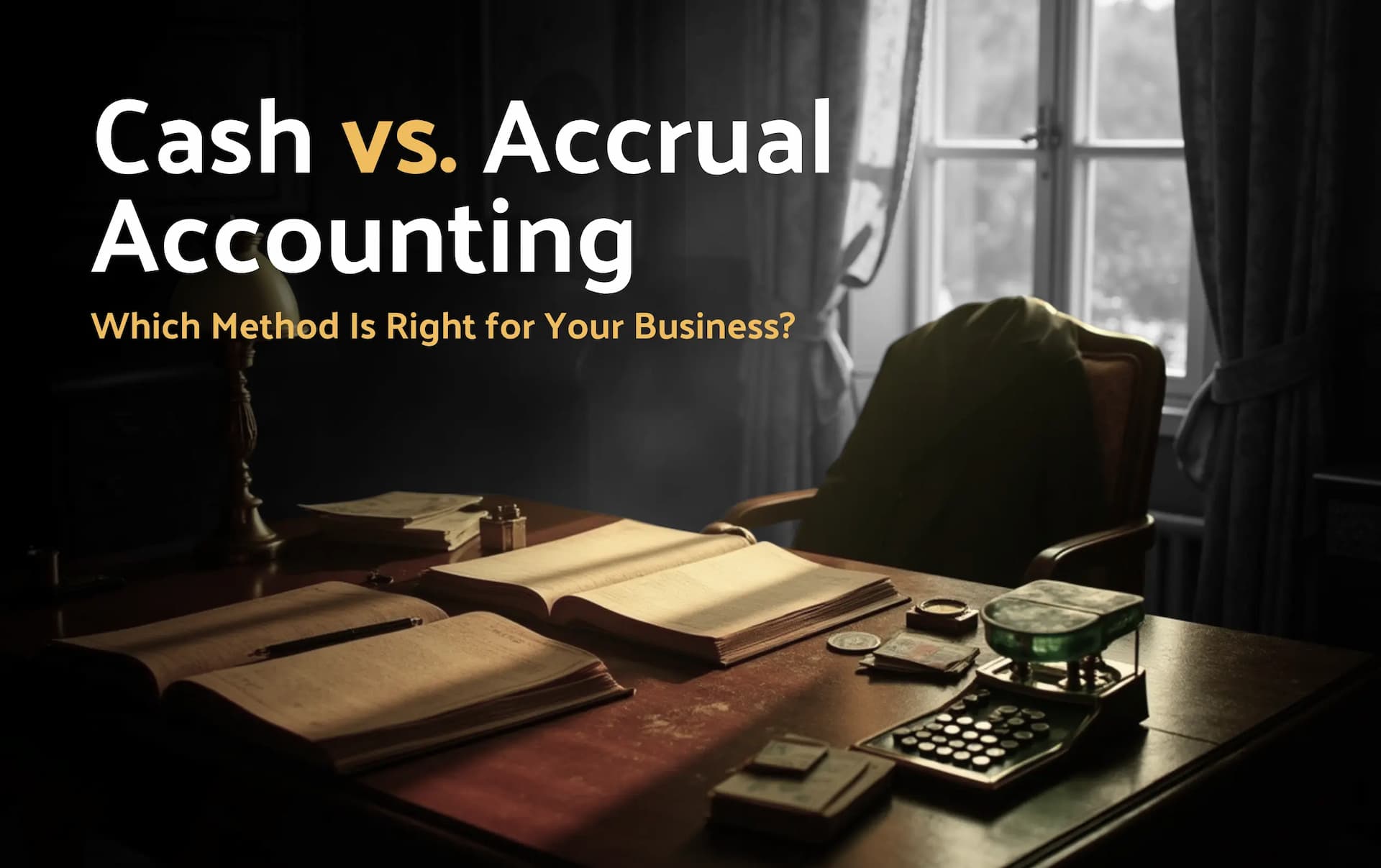
Ever had that moment where you check your bank account, feel rich for a second, and then realize a bunch of bills haven’t hit yet?
Yeah, that’s a false sense of financial freedom. And that’s exactly where accounting steps in.
It’s not just about knowing what’s sitting in your account today, but understanding what’s coming in, what you still owe, and what’s truly yours in the end.
Welcome to the world of cash and accrual accounting two ways of telling the financial story of your business.
One is like checking your wallet. The other is like forecasting your whole financial season.
Let’s break down where these methods came from, how they work, and which one works best for your business.
A Quick Trip Through Accounting History
Back in ancient Mesopotamia, around 7,000 years ago, people used clay tokens to keep track of goods like grain or livestock. If someone gave ten goats in exchange for barley, they recorded it on a clay tablet to document the deal, an early form of bookkeeping.

Later, in medieval Italy, merchants trading across seas needed better ways to track deals, debts, and profits. That’s when a more organized method of record-keeping emerged one that captured both sides of every transaction to give a clearer picture of business activity.
In 1494, an Italian mathematics genius named Luca Pacioli published a book called Summa de Arithmetica, in which he explained this system in detail. He documented the Venetian method of bookkeeping, laying the foundation for the accounting system we still use today.

What Is Cash Basis Accounting?
At its heart, cash basis accounting is like tracking your bank balance:
• Revenue is recorded when you actually get paid (e.g., when a check clears).
• Expenses are recorded when you actually pay (e.g., when you swipe your card).
This method is all about real-deal cash flow, what’s actually in the bank.
Who Uses It?
Solo-preneurs and micro-businesses like freelance web developers, local contractors, or side-hustle Etsy sellers, often choose this method.
Pro tip: The IRS allows it for businesses with under $25–30 million in annual revenue and for pass-through entities like sole proprietorships, partnerships, and S Corps.
Example: Jenna’s Juice Bar
Jenna runs a small juice bar and sells monthly packages for $300. A customer pays in full on April 1st for juice deliveries throughout the month.
• Under cash basis, Jenna books the full $300 as income on April 1st, when the money hits her account.
• She buys ingredients weekly for $60 and logs each $60 payment the day she buys it.
So, for April:
• Revenue: $300
• Expenses: $240
• Profit: $60
But if the customer had paid in March, the $300 would show in March even though she delivered juices in April. So, March looks great, and April looks a bit underwhelming.
What Is Accrual Basis Accounting?
Accrual accounting is like running your business with a smart calendar.
You record:
• Income when it’s earned (even if the money hasn’t hit your bank yet)
• Expenses when they’re incurred (even if you haven’t paid the bill)
Why It’s a Go-To:
• Offers a sharper, more accurate look at profitability
• Required under GAAP (Generally Accepted Accounting Principles)
• Public companies must use it
• Preferred by lenders, investors, and banks
• Gives you insight into Accounts Receivable (A/R) and Accounts Payable (A/P) so you're not flying blind.
Tax Talk: How These Methods Affect Your Taxes
Cash Basis & Taxes
Cash method is like: “No cash in hand? No tax owed.”
You pay taxes only when you receive income and deduct expenses only when you’ve paid for them.
Benefits:
• Control: Delay income or accelerate expenses to manage tax liability
• Simplicity: No need to track receivables or payables
Watch out: If someone pays you a fat advance at year-end, your tax bill might spike even if you haven’t delivered the product/service yet.
Accrual Basis & Taxes
• You pay tax when you earn income, not when you receive it.
• You deduct expenses when they happen, even if not yet paid.
It’s more accurate but it can sting.
Example: Say you did a big $10,000 job in December. Under accrual, you record that income in December even if the client doesn’t pay until February. You’re taxed on that $10K in December, even if your bank account is still waiting for it.
Quick Comparison: Cash vs. Accrual

Choosing the Right Method for Your Business
Let’s keep it real the right choice depends on where you are and where you're headed.
Choose Cash Basis if:
• You’re a solo or small business with real-time payments
• You want simplicity and clear cash visibility
• You’re under the IRS revenue threshold (under $25–30M)
Choose Accrual Basis if:
• You extend credit or pay invoices later
• You hold inventory or offer long-term contracts
• You need credibility with lenders/investors
• You’re planning to scale or go public
• You want GAAP compliance
Note: Once your revenue exceeds $25–30 million, accrual becomes mandatory under GAAP and IRS rules.
Hybrid Accounting: Best of Both Worlds?
Some businesses use a hybrid approach:
• Cash method for day-to-day operations
• Accrual for tracking inventory, contracts, or larger expenses
But beware:
• It’s not GAAP-compliant
• Managing two systems can get messy
Making the Right Choice
We’ve journeyed from ancient clay tablets to modern accounting systems.
Whether you're just starting out or scaling fast, choosing the right method is key to making informed decisions.
• Consider where your business stands today
• Think about where you want it to go
• Pick the method that gives you clarity, control, and confidence
Still unsure which method fits your business best?
Reach out, we’re here to help you make the right call.

Shekhar Mehrotra
Founder and Chief Executive Officer
Shekhar Mehrotra, a Chartered Accountant with over 12 years of experience, has been a leader in finance, tax, and accounting. He has advised clients across sectors like infrastructure, IT, and pharmaceuticals, providing expertise in management, direct and indirect taxes, audits, and compliance. As a 360-degree virtual CFO, Shekhar has streamlined accounting processes and managed cash flow to ensure businesses remain tax and regulatory compliant.
You might also like:
Listen Exclusive Podcast On

